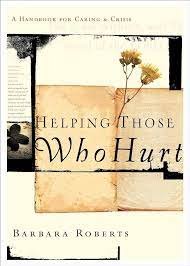When Someone You Know Is Grieving
-
Blessed are those who mourn, for they shall be comforted. Matthew 5:4
Grief is a natural and emotional response to loss. It can be triggered by various types of losses, such as the death of a loved one, the end of a relationship, or significant life changes.
Grief involves a large and varying range of emotions, including sadness, anger, guilt, and in some cases, even relief.
Grief is a personal experience, and is not the same for everyone. Often times, people rotate through different emotions as they begin to experience and come to terms with the impact of their loss.
Some people who are grieving may grieve publicly and others privately, and in other cases, some desire to impress on others that they are not grieving at all are are simply doing okay.
While grief itself never completely goes away after a loss, people can learn to live with their grief in a way that doesn’t interfere with their daily life and activities. It just takes time.
While you may feel inadequate or ill-equipped to help or be around someone dealing with grief, it’s important to know that your simple presence is a big support tool. There are people who have been given the spiritual gift of care in this way, but everyone has the ability to be part of the healing process for others.
Don’t allow your discomfort to prevent you from reaching out a person who is grieving. That alone will be received as a form of support. Let them know that you are there to listen if they want to talk. While some may want to talk about anything, there will be others who hesitate as to not want to impose on others time or make the supporter uncomfortable. Again, simply acknowledging a persons’ loss will go a long way and help them feel permission to talk.
People in grief need to feel free to express their emotions whatever they are. You will provide much needed support if they know that it’s okay to break down in front of you, or to express anger, frustration, or any other emotion. Your role is not to help them feel a certain emotion or to stop feeling a certain way. Your role is allowing a safe space for vulnerability.
-
While it may be uncomfortable, supporting a person who is grieving is not difficult. Below are some ways you can show care and support to someone who is greiving.
-Simply be present with the grieving person
-Cook a meal or organize a meal train.
-Make a grocery run
-Help with funeral arrangements
-Help with house or yard work
-Take them for a ride or to a local restaurant.
-Take them for a walk or to the gym to exercise.
-Help perform basic chores
-Take them for one of their normal activities
-Help provide or coordinate child care or activities to entertain kids.
-Coordinate kid rides to and from school or other activities.
-Care for pets
-Pray and/or organize a prayer teamThink practically and purposely. If you see a need, even the most basic, see how you can help.
-
When talking with a person grieving, there are things that are helpful and things that are not, which can contribute to the exact opposite of healing.
Avoid things that minimize their loss:
“I know how you feel.”
“You’re strong; you can handle it.”
“You still have so much to be grateful for.”
“It’s for the best.”
Saying these types of things only add to the pain because they reduce the loss rather than recognizing the deep suffering the person is experiencing.
Avoid giving unsolicited advice:
“You need to get over it and move on.”
“Be strong.”
“Try to look at the bright side of this.”
These attempts to motivate or cheer them up will make the grieving person feel like you are telling them to ignore the pain.
Don’t Spiritualize the loss:
“God doesn’t give you more than you can handle.”
“Everything happens for a reason.”
“He is in a better place.”
“It was God’s will.
You don’t know for sure every detail of God’s plan or where someone was on his or her spiritual journey. Spiritualizing statements can do more harm than good.
-
The following are statements and questions you can say or ask that may be encouraging to someone grieving.
-I am very sad to hear about your loss.
- How are you doing in this moment?
- Take your time, I am here.
- I care about what you are going through.
- What can I do to help you get through today?
- I’ve never been where you are but can imagine you are in incredible pain right now.
- How may I pray for you today?
-Tell me a good memory you have of loved one.
-I'll always remember [the deceased] for [positive memories].
-I cherish the moments we shared with [the deceased].
-The impact that he/she had on our lives will be remembered forever.
-I am here if you need anything. I can run errands, pick up kids, grab some groceries. Please ask me and I will do it.
Helpful Resources
Below are resources that have been extremely helpful to those who are caring for someone who is grieving. Whether you have a heart to serve in this way, or you know someone who is currently grieving, these resources will help you along the way.
Read Helping Those Who Hurt
A Handbook for Caring in Crisis by Barbara Roberts
Make it stand out
Whatever it is, the way you tell your story online can make all the difference.
Watch a Video Based Study on Grief via Right Now Media
Do you have a heart to serve in this way?
Email us at care@relevantcommunity.org for information about serving opportunities.




